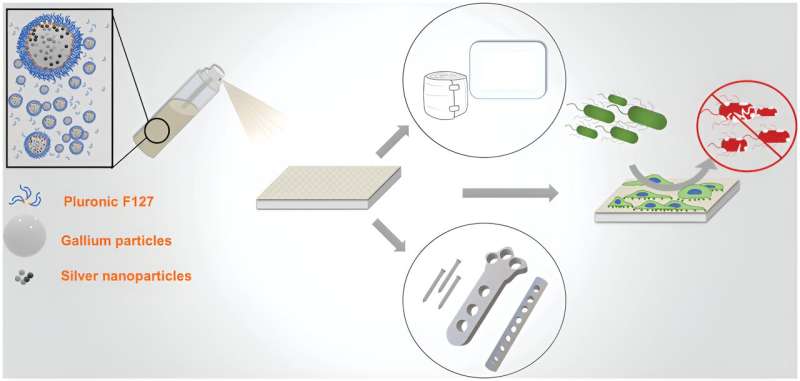This article has been reviewed according to Science X's editorial process and policies. Editors have highlighted the following attributes while ensuring the content's credibility:
fact-checked
peer-reviewed publication
trusted source
proofread
New implants could reduce infection and lead to better recovery from orthopedic surgery

Superior knee and hip replacements are a step closer after Flinders University and Chinese researchers further test and develop a new orthopedic implant coating that has the strong ability to ward off infection—as well as stimulate bone growth.
The technology, which has been patented after more promising results detailed in the journal Advanced Functional Materials, consists of novel Silver-Gallium (Ag-Ga) nano-amalgamated particles that can be easily applied to medical device surfaces. The article is titled, "Silver-Gallium Nano-Amalgamated Particles as a Novel, Biocompatible Solution for Antibacterial Coatings."
"The antibacterial capabilities of compounds derived from silver have been extensively researched. However, the cytotoxicity of silver ions currently poses a significant obstacle for the utilization of silver ions in medical materials," says corresponding author Dr. Vi-Khanh Truong, from the Biomedical Nanoengineering Laboratory (BNL) at Flinders University.
"Our new formula involving Ag-Ga nano-amalgamation ensures the sustained release of silver and gallium ions in a very controlled manner to eliminate these issues."
Senior author Matthew Flinders Professor Krasimir Vasilev, director of the Biomedical Nanoengineering Laboratory at the College of Medicine and Public Health at Flinders University, says the discovery provides an urgently needed solution to medical device-associated infections.
"The new material could be easily and controllably applied by spray-casting on many medical devices to protect them against infection, and also provide anti-inflammatory effect and stimulate bone growth," says Profesor Vasilev.
"Our latest testing indicates this combination of antibacterial protection and tissue integration properties can benefit many devices in the orthopedic, trauma, and also dental areas."
Infections after orthopedic implant surgery are a global health issue, with rates ranging from 2% to 10% in developed countries and up to 15% in developing regions.
In the US alone, there are more than 100,000 cases of orthopedic device-related infections. A 2017 Australian study showed a 1.7% infection rate post-hip or knee replacements. About 6% of orthopedic implant infections lead to intensive care with a mortality rate up to 4.6%. The cost of treating such infections can exceed US$100,000 per case.
The latest testing was supported by collaborators including Professor Yunpeng Zhao, a surgeon at the Qilu Hospital and University of Shandong colleagues in China.
The Ag-Ga nano-amalgamated particles exhibited potent antimicrobial properties against a broad spectrum of bacterial strains in animal models.
Dr. Truong, from the Flinders Biomedical Nano-engineering Laboratory, says the discovery has the potential to apply to various implantable devices, catheters and other access devices, and even wound dressings where infections are also problematic.
"Commercialization opportunities could make this solution available to clinicians and patients in the near future—at a time when growing antibiotic resistance is yet another problem in global health care."
GaLM was used to facilitate the galvanic deposition of silver nanocrystals (Ag) on the oxide layer. The GaLM not only serves as a carrier for silver through the galvanic replacement process but also provides a controlled-release mechanism for silver.
First author Master of Biotechnology student Tien Thanh Nguyen also worked with fellow Flinders researchers on the latest study in collaboration with clinical experts from Shandong University and Shandong hospitals.
More information: Tien Thanh Nguyen et al, Silver─Gallium Nano‐Amalgamated Particles as a Novel, Biocompatible Solution for Antibacterial Coatings, Advanced Functional Materials (2023). DOI: 10.1002/adfm.202310539




















